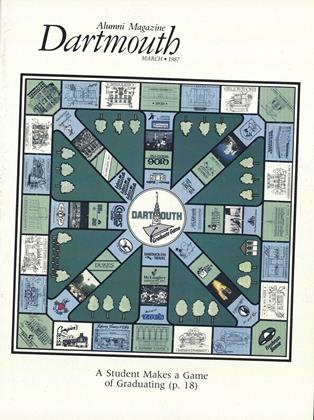The crux of Matt Mcllwain's invention is an elementary form of game theory, a concept that was created during the 1950s and is commonly used today by researchers to apply mathematics to decisions by groups or individuals. The scheme below, which appears on one of the Dartmouth Graduate Game cards, is what game theorists call a "payoff matrix." The player who draws the card is designated player 1. He challenges another person, who becomes player 2. Each one decides whether he wants "major" or "distributive" credits.
If both players choose "major" on this card, both earn three credits. On the other hand, if player 1 chooses "distributive" and player 2 chooses "major," player 1 loses two credits and player 2 gains two.
The matrix cards are built around the Prisoner's Dilemma, one of game theory's basic analogies. Two prisoners held in different cells are given the choice of whether to confess or keep silent. If neither confesses, both will be given a short sentence on some trumped-up charge. If both confess, their cooperation will cause the judge to go light on them. If one confesses and the other clams up, the one who talked will be released while the other gets the maximum sentence. Each prisoner knows the other has been given the same proposition, and each is left alone to agonize over the decision.
Although the two prisoners hardly enjoy their plight, it repres ents a kind of game, according to Michael Bacharach, author of Economics and the Theory of Games. Bacharach defines a "game" as "an activity of two or more human beings whose outcome matters to each of them, and depends in a prescribed way on the actions of all of them." The advantage of game theory to science, according to Bacharach, is that it "confronts the interdependence of people's decisions and the uncertainty under which they have to make them."
This real-world characteristic has made the theory useful in economics, political science, language study, computer programming and sociology. Games have been used to analyze stories in the Old Testament, to explain Watergate, and to predict the outcome of a call on the hot line from Washington to Moscow.
Mcllwain's use of the Prisoner's Dilemma is more modest: "It lends an element of suspense to what otherwise would be just another board game," he says.
FRATERNITY MATRIX PLAYER 2 MAJOR 3/3 2/-2 DIST -2/2 -2/-2 PLAYER 1 MAJOR DIST
 View Full Issue
View Full Issue
More From This Issue
-
 Feature
Feature"These Children Are the Future"
March 1987 By Shelby Grantham -
 Cover Story
Cover StoryPassing With A Roll Of The Dice
March 1987 By Jay Heinrichs -
 Feature
FeatureThe Magic Bullet
March 1987 By B.J. Schulz arid Mary McFadden -
 Feature
FeatureOne Question for Mr. Frost
March 1987 By Philip Booth '47 -
 Article
ArticleDartmouth Authors
March 1987 -
 Class Notes
Class Notes1983
March 1987 By Ken Johnson







